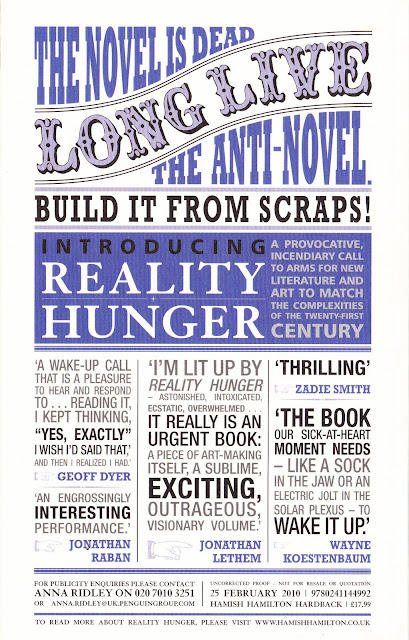 |
| Michael Christopher Brown/Magnum Photos Goma, Congo, December 14, 2012 |
Trapped Inside the Novel
I wonder how many people share the experience described by David Shields in Reality Hunger, of tackling some large novel, a work essentially conventional in its structure and brand of realism, that weaves together the lives of its characters over a number of years, and simply feeling that the whole exercise has become largely irrelevant. Shields doesn’t present his remarks as a criticism of writers—the name he mentions is Jonathan Franzen—pursuing the tradition of the long realistic novel. Rather, he suggests it is a change in himself, something he believes has been brought about by the utterly changed nature of contemporary life. He considers the variety of electronic media—the proliferation and abbreviation of all forms of messages, the circumstances created by the ever more rapid transit and greater abundance of information, the emergence of a powerful virtual world that becomes more real to us all the time—and he concludes that given this way of life it is hard for the traditional kind of novel to hold our attention. He then looks at a variety of texts that, unlike the traditional novel, weld together chunks of “reality,” pieces of documentary taken from elsewhere, quotations, fragments, provocations, moments of lyricism, and melodrama, perhaps from film or television, newspapers or websites, to create an entirely different reading experience.
I share Shields’s changing reaction to traditional novels. More and more I wonder if it is possible for a novel not to give me the immediate impression of being manipulated toward goals that are predictable and unquestioned: the dilemma, the dramatic crisis, the pathos, the wise sadness, and more in general a suffering made bearable, or even noble through aesthetic form, fine prose, and the conviction that one has lived through something important. But to go from that to fragmented, rapidly intercut chunks of “reality,” however powerfully they may evoke certain aspects of contemporary living, doesn’t work for me, nor do I entirely agree with Shields’ analysis, however strongly and passionately he makes his case.
First of all, it is clear that many people who are entirely at home with their iPhones and iPads, music clapped to their ears and text messages vibrating in their pockets, still very much enjoy the traditional novel—regardless of whether it offers an account of life that corresponds to theirs. Otherwise how to explain the vast numbers of readers picking up the work of a Hilary Mantel, a Richard Ford, or, on the more popular side, a Stieg Larsson or an E.L. James? If the form is losing its seduction for some, it is clearly alive and well for many. Indeed, its very distance, in most cases, from the texture of modern life, the impression it can give of shape, continuity, and hence meaning, may be its most reassuring and attractive aspect. The growing popularity of historical novels would tend to confirm this. Such works as Wolf Hall, this year’s Man Booker winner The Luminaries (both more than 600 pages), and the prize’s “runner up,” Jim Crace’s Harvest, or again the much-praised The Traveler of the Century by Spanish novelist Andrés Neuman, all suggest in different ways that, despite its enigmas, we know more or less what a life is or should be, we can follow its trajectories, we can put the past in relation to the present.
This is exactly where my dissatisfaction with the form begins. Over recent years I have preferred the works of writers, many long dead, who seemed to share my anxiety that the traditional form was scandalously overconfident: Beckett’s novels, Thomas Bernhard’s, more recently, the strange amalgamation that is Lydia Davis’s lifelong collection of short stories, if stories really is the right word for them. Even so, this kind of writing, and with it the whole postmodern adventure, seems to derive its energy by gauging its distance from the traditional novel, by expressing its disbelief and frustration with the form, and there is a limit to the pleasures, comedy and wisdom of negative energy and deconstruction. One risks ending up like the goat in Beckett’s Watt, who, chained to a post, has wrenched the post from the ground, but has no idea where to go and is hampered by the chain still fastened round his neck and by the post which continues to clatter wherever he turns. The pathos of failing to achieve meaning replaces the more immediate pathos that clings in the traditional narrative to the characters’ meaningful lives. But Beckett’s fiction, however wonderful, is the novel as noble dead end, a heroic bivouac on the edge of a civilization in denial.
My problem with the grand traditional novel—or rather traditional narrative in general, short stories included—is the vision of character, the constant reinforcement of a fictional selfhood that accumulates meaning through suffering and the overcoming of suffering. At once a palace built of words and a trajectory propelled by syntax, the self connects effortlessly with the past and launches bravely into the future. Challenged, perhaps thwarted by circumstance, it nevertheless survives, with its harvest of bittersweet consolation, and newly acquired knowledge.
I’m being reductive. The variety of stories told in the novel is indeed remarkable, but the tendency to reinforce in the reader the habit of projecting his or her life as a meaningful story, a narrative that will very likely become a trap, leading to inevitable disappointment followed by the much-prized (and I suspect overrated) wisdom of maturity, is nigh on universal. Likewise, and intrinsic to this approach, is the invitation to shift our attention away from the moment, away from any real savoring of present experience, toward the past that brought us to this point and the future that will likely result. The present is allowed to have significance only in so far as it constitutes a position in a story line. Intellect, analysis, and calculation are privileged over sense and immediate perception; the whole mind is pushed toward the unceasing construction of meaning, of narrative intelligibility, of underlying structure, without which life is assumed to be unimaginable or unbearable.
It is a way of seeing that is bound to produce states of profound disappointment for those who subscribe to it. “Munro brilliantly tracks the lives of those who did not achieve what they expected to,” exclaimed one British paper after this year’s Nobel prize was announced. It hardly seems a cause for congratulation if the Western mindset is constructed around first projecting extravagant ambitions, the infamous “dream,” and then relying on authors like Alice Munro to offer consolation when it isn’t achieved, or alternatively to live it vicariously through those who do achieve it, by reading celebrity biographies, another increasingly popular genre. In this regard, one can even see the consolations of literature as one of the forces sustaining a destructive cultural pattern. We are so pleased with our ability to describe and savor our unhappiness it hardly seems important to find a different way of going about things.
What I don’t understand is whether this kind of narrative strategy is a natural consequence of choosing the novel form, or simply the default setting of fiction in our culture. Beckett famously felt that the problems of literary fiction were inherent in language itself, in its overconfident, unquestioning forward motion, and that the only response possible was, as it were, to write against language, to expose it, have it trip itself up. In a much-quoted letter written in 1937, he even imagined a time when language itself might be dissolved or eliminated:
It is indeed becoming more and more difficult, even senseless, for me to write an official English. And more and more my own language appears to me like a veil that must be torn apart in order to get at the things (or the Nothingness) behind it. Grammar and Style. To me they seem to have become as irrelevant as a Victorian bathing suit or the imperturbability of a true gentleman. A mask. Let us hope the time will come…when language is most efficiently used where it is being most efficiently misused. As we cannot eliminate language all at once, we should at least leave nothing undone that might contribute to its falling into disrepute. To bore one hole after another in it, until what lurks behind it—be it something or nothing—begins to seep through; I cannot imagine a higher goal for a writer today.
A few years ago, Colm Tóibín—at present one of the finest masters of the traditional narrative form, the dying fall, the sad accumulation of pathos and wisdom—observedthat Beckett himself was second to none when it came to manipulating grammar and style, as if that constituted a contradiction. Not at all: the problem lies exactly in feeling that one’s skills are only suitable for a project that no longer makes sense. So many writers are now able to produce passable imitations of our much-celebrated nineteenth-century novels (again The Luminaries is a case in point). Their very facility becomes an obstacle to exploring some more satisfactory form.
So, is there a way forward in words that could express a quite different vision of self and narrative? In my own small way I tried to do this in my recent novel Sex is Forbidden, where a young woman in a Buddhist meditation center is seeking to move away from mental habits—ambition, regret, unhappy love—which have entrapped and humiliated her. I don’t think I succeeded. Buddhism, as a set of teachings and practices that invite the dissipation of the “fiction” of self and a quite different idea of social involvement and personal trajectory, became in the end simply a stark contrast that exposed the extent to which the girl was trapped in the Western obsession of creating one’s own successful life story. Most readers, I’m sure, were eager for her to avoid the seductions of nirvana. More generally, the tale’s literary nature, its very presentation of itself as a novel—perhaps I just mean my own ambitions—inevitably dragged it back toward the old familiar ploys, the little climaxes, the obligatory ironies. True, one could set them up and then retreat from them, prepare and not deliver, encourage the reader to see how wearisomely novels do go in a certain direction. But the whole endeavor was like sailing against a strong wind: however hard you point to the open sea you are constantly blown back on the familiar coast. When the moment comes to discuss the blurb with the publisher you know that you haven’t done anything new.
To conclude: in 2011 I had occasion to visit an old university tutor, a rather severe and demanding professor, who nevertheless played a generous part in encouraging me to write. He read my first attempts at fiction and introduced me to writers who would later be important to me, most notably Henry Green. I had not seen him in thirty years. Long since retired, he was now restricted to a wheelchair and, with time on his hands, had been re-reading old favorites, all the great novels that had inspired a lifetime’s career in reading, writing, teaching. We talked about Faulkner, Fitzgerald, Hemingway, Henry Green, Elisabeth Bowen, Anthony Powell.
“How did they hold up?” I asked cheerfully.
“Not at all,” he told me. “They feel like completely empty performances. Like it wasn’t worth it at all.”
Coming out, it felt like I’d just been to a very challenging tutorial.



No comments:
Post a Comment